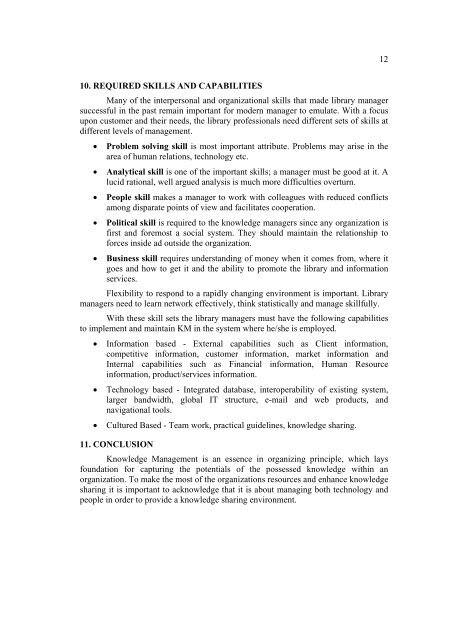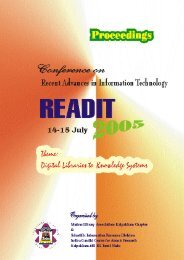READIT - 2009 - Indira Gandhi Centre for Atomic Research
READIT - 2009 - Indira Gandhi Centre for Atomic Research
READIT - 2009 - Indira Gandhi Centre for Atomic Research
Create successful ePaper yourself
Turn your PDF publications into a flip-book with our unique Google optimized e-Paper software.
12<br />
10. REQUIRED SKILLS AND CAPABILITIES<br />
Many of the interpersonal and organizational skills that made library manager<br />
successful in the past remain important <strong>for</strong> modern manager to emulate. With a focus<br />
upon customer and their needs, the library professionals need different sets of skills at<br />
different levels of management.<br />
<br />
<br />
<br />
<br />
Problem solving skill is most important attribute. Problems may arise in the<br />
area of human relations, technology etc.<br />
Analytical skill is one of the important skills; a manager must be good at it. A<br />
lucid rational, well argued analysis is much more difficulties overturn.<br />
People skill makes a manager to work with colleagues with reduced conflicts<br />
among disparate points of view and facilitates cooperation.<br />
Political skill is required to the knowledge managers since any organization is<br />
first and <strong>for</strong>emost a social system. They should maintain the relationship to<br />
<strong>for</strong>ces inside ad outside the organization.<br />
Business skill requires understanding of money when it comes from, where it<br />
goes and how to get it and the ability to promote the library and in<strong>for</strong>mation<br />
services.<br />
Flexibility to respond to a rapidly changing environment is important. Library<br />
managers need to learn network effectively, think statistically and manage skillfully.<br />
With these skill sets the library managers must have the following capabilities<br />
to implement and maintain KM in the system where he/she is employed.<br />
In<strong>for</strong>mation based - External capabilities such as Client in<strong>for</strong>mation,<br />
competitive in<strong>for</strong>mation, customer in<strong>for</strong>mation, market in<strong>for</strong>mation and<br />
Internal capabilities such as Financial in<strong>for</strong>mation, Human Resource<br />
in<strong>for</strong>mation, product/services in<strong>for</strong>mation.<br />
<br />
<br />
Technology based - Integrated database, interoperability of existing system,<br />
larger bandwidth, global IT structure, e-mail and web products, and<br />
navigational tools.<br />
Cultured Based - Team work, practical guidelines, knowledge sharing.<br />
11. CONCLUSION<br />
Knowledge Management is an essence in organizing principle, which lays<br />
foundation <strong>for</strong> capturing the potentials of the possessed knowledge within an<br />
organization. To make the most of the organizations resources and enhance knowledge<br />
sharing it is important to acknowledge that it is about managing both technology and<br />
people in order to provide a knowledge sharing environment.

















